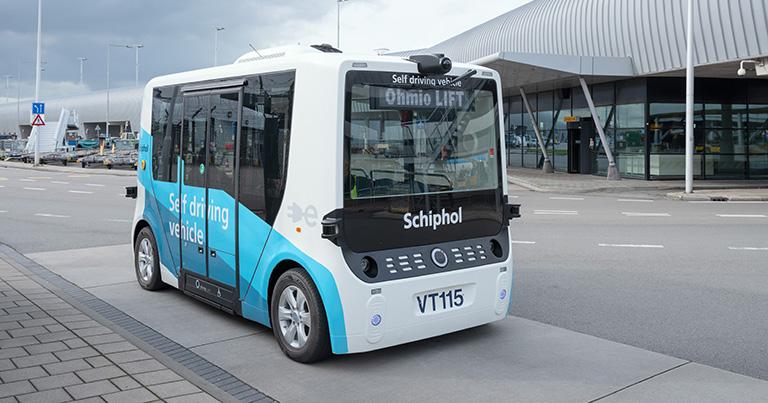Schiphol trials electric self-driving airside buses as part of vision for fully autonomous ground operation by 2050
The following article was published by Future Travel Experience
Royal Schiphol Group – a Corporate Partner of the FTE Digital, Innovation & Startup Hub – is testing electric self-driving buses as part of its vision to achieve a fully autonomous ground operation by 2050.

Royal Schiphol Group – a Corporate Partner of the FTE Digital, Innovation & Startup Hub – is testing the use of electric autonomous buses. Every day, two self-driving Ohmio buses are following a fixed route and making stops at various locations on the airside. These stops are close to the facilities of several cleaning and ground handling companies. The shuttle service is for employees working at those locations. With this trial, the airport wants to investigate what the advantages of autonomous transport can be and what employees think of it.
In the first phase of the trial, the technology behind the buses is being thoroughly tested and adapted to the airport infrastructure. The shuttle service is currently being used by employees and their experiences with self-driving transport are being investigated. Of the employees who use the autonomous service, 89% are willing to use it again. The initial findings show that the service is seen as safe and as a positive experience. The airport will continue testing the technology and assessing the possibility of expansion until the end of April.
“This trial represents another step towards our ambition of having an emission-free and autonomous ground operation by 2050,” said Jan Zekveld, Head of Innovation, Royal Schiphol Group. “The knowledge and insights gained during this test period are of significant added value to future autonomous developments at Schiphol.”
Schiphol is the first Dutch airport to use this technology from Ohmio, the supplier of the autonomous buses, to transport people amid other airside traffic. These so-called Automated Guided Vehicles are programmed to drive fixed routes while considering other road users, their position on the road and when they should stop or give way to traffic.
The autonomous buses each have the capacity to transport eight people at a time. Employees can board from a staff passageway that provides access to airside, and board and alight at any location that is on the route. Each journey lasts around five minutes.
“This collaboration underscores Ohmio’s commitment to advancing visionary approaches for the future of transport,” said Mohammed Hikmet, Executive, Ohmio. “We are enthusiastic about the opportunity and are honoured to join hands with Schiphol Airport, a leading player in Europe’s aviation industry.”
In 2050, Royal Schiphol Group wants to operate the world’s most sustainable and high-quality airports. The creation of a more sustainable and emission-free ground operation contributes to this ambition. Royal Schiphol Group envisions that by 2050 all vehicles will have been replaced by a contiguous fleet of autonomous, zero-emission vehicles and all associated processes automated. Even in an autonomous ground operation, the employee will still have an important role to play. The work will be more directive in nature and will involve a variety of tasks.
Article originally published here:
Schiphol trials electric self-driving airside buses as part of vision for fully autonomous ground operation by 2050
from Future Travel Experience https://ift.tt/5tMqV4x
Comments
Post a Comment